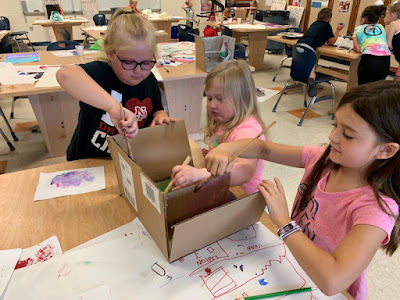Things will be different.
Things will be different. As I've mentioned many times before in this blog, I am an art teacher of young children, I am not a writer. But writing things out helps me process through bigger ideas. If I can parse out a few words here and there, I can look at what I write to see if it makes any sense. It is my own sounding board so to speak. This piece is from a teacher's perspective. My ideas are not taking into account the parent perspective which is a very important perspective. Plus, nobody is going to read it here anyway.
Over the last 60 days, I have been in a pretty hunkered down in a secure environment at home. My wife of 30 years is hell-bent on keeping me healthy no matter what I do to the contrary. Thank You, Thank You, Thank You! I get daily reminders to wash my hands, not to touch any communal surfaces unless they've been cleaned, not to touch any mail/delivery, everything is stored in the "hot zone", our garage, for three days before she brings it in for distribution. All groceries are wiped down with disinfecting wipes and put away. She is very good at what she does... and we're adults.
But things will be different. What will this look like when we go back to school? Schools are infamously known as Petri dishes: hotbeds of every germ you can imagine and then more. On top of this, they are "the" place for kids to socialize. These two don't mix well with our recommendations for social distancing. How many protocols will we need to invent for this scenario to happen? We will definitely need to be creative and flexible. It's not like we can just fling open the doors and welcome in the kids. Serious thought needs to be considered regarding not only the health of the children but everyone working in the building; from bus drivers, cafeteria workers, custodians (our essential workers) to the teachers, support staff, and administration.
I've worked in education for 30 years, and have seen a general paucity of cleanliness at the hands of children and adults. If we as adults have issues with being vigilant with hand-washing, not touching our faces, wiping down surfaces, etc. What will this look like when we ask, no demand our kids to do the same?
Kids are not the greatest at doing the basic, most important aspect of cleanliness: washing hands. Believe me, I work right across from one of the bathrooms in our school. If I had a nickel for every time I asked a child if they washed their hands, I literally would be a millionaire. See kids don't think about consequences like adults do. They live in the moment 24/7. How many times have you experienced asking your child to do something and it never gets done? Kids want to run up and hug you and give you high-five. It's what they're used to. We, on the other hand, have what's called experience. We know that if we drop candy on the floor of an elementary school, the 7-second rule does NOT apply. Or that finding anything on the floor, be it a crayon, lego, or plastic dinosaur, should not be put in one's mouth.
So what needs to happen in order to reopen our schools? For whatever we decide to do, there will be some extra costs involved, there always is. What will we need to do so that our school community will feel safe enough to return? This discussion needs to include our elected officials, health experts, teachers, parents, and the community in general. We need to work together to come up with several wide-reaching solutions and contingency plans that go beyond handwashing and hand sanitizer.
Thinking about the three things we need to all do social distancing, hand washing, and masks. What does the learning day look like?
Before kids go to school, they will need to have their temperature taken. If they're above a certain temperature, they shouldn't come to school. But as every teacher knows, parents send their kids to school anyway. Not they're being callous, it's just some kids run warm. But what if they are sick or get sick while at school? How does the school react? Do they shut down the whole school and send everyone home who had contact with the student? Send the whole classroom home or just the child? If they rode a bus, does the entire bus need to go home and quarantine? What kind of stigma will follow the child if he/she is the one to cause everybody to go home?
Let's assume that all kids must have masks. Does the school require everyone in the school to wear a mask? But kids are constantly forgetting things, so we need to have masks available for everyone in a time where masks are hard to come by. What if they don't wear one? Is it an all or nothing scenario?
How many students will be allowed in school at any one time? Will there be a hard number of students per school, grade, classroom? How many kids will be allowed to ride the bus? Small busses hold about 66 kids. If we keep social distancing on busses that number drops to about 15. That means a bus will make four trips to get the same amount of kids to school. Maybe implement a tiered arrival time? If this is the case at what time will the learning begin? Let's assume we adopt an alternating schedule, how will we decide which kids come to school at certain times or on certain days? Alphabetically, random draw, lottery?
Social distancing. Sounds easy enough. Keeping a distance of 6 feet apart is easier said than done in a building that is designed to put many people together.
Once the learning day begins, how will instruction look? Will kids need to stay in their seats for long periods of time to stay safe? I hope not. Research has shown how important movement is to learning and I don't want the children to be forced to sit at their desks for long periods of time. That would make school unbearable.
What about the bathroom? Will there be someone to monitor who goes in and out? To make sure they washed their hands for 20 seconds? What about books, pencils, and other things in the classroom. Children will probably need their own set of materials including hand sanitizer and wipes. But what about the students who can't afford all this? Will there be money available to help families in need? But as usual, I’m sure teachers will step up and supply those as well.
What about lunch, recess, specials classes like music, art and media? Everything needs to be examined and a reasonable solution developed.
What if we held classes outside for a majority of the day. I've read some schools are doing this. This is a good solution for those climates that would allow it. In Indiana? not so great. August and September in Indiana are excruciatingly hot.
Once we come up with these solutions how will we vet it out? This is all new and terrifying to think about but I know that whatever we decide to do, our teachers, our community will approach it with the same enthusiasm as they did when this all started. It will be fluid. It will be flexible and a work in progress. Yes, things will be different.



Comments
Post a Comment